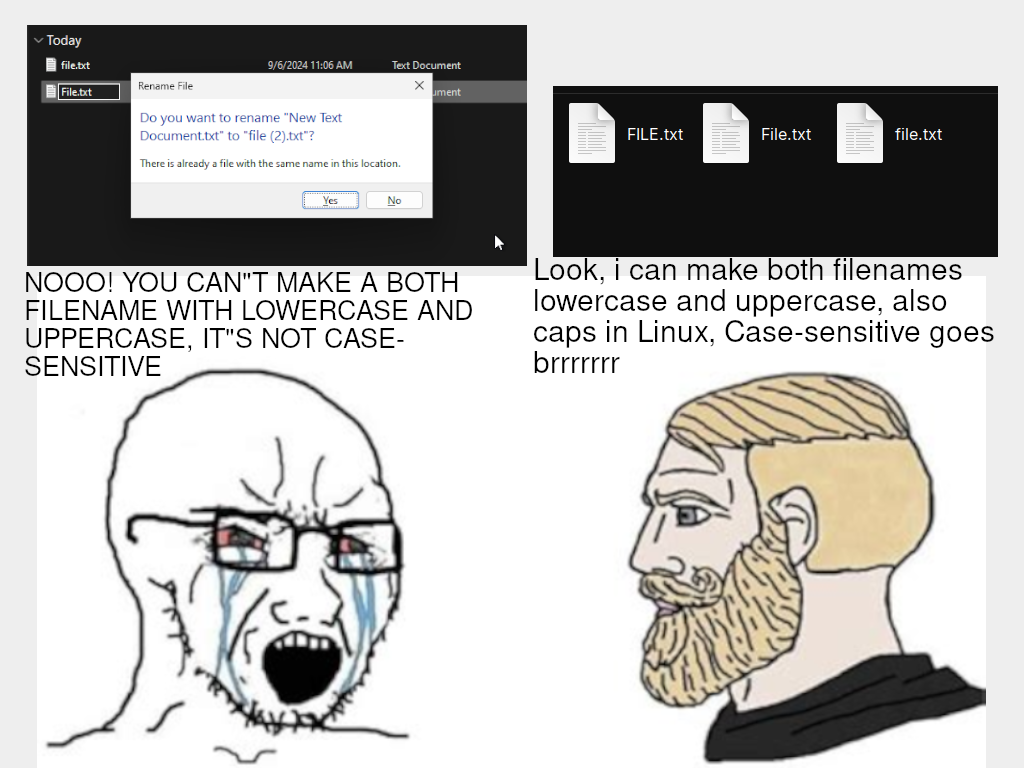this post was submitted on 06 Sep 2024
611 points (90.4% liked)
linuxmemes
25270 readers
783 users here now
Hint: :q!
Sister communities:
Community rules (click to expand)
1. Follow the site-wide rules
- Instance-wide TOS: https://legal.lemmy.world/tos/
- Lemmy code of conduct: https://join-lemmy.org/docs/code_of_conduct.html
2. Be civil
- Understand the difference between a joke and an insult.
- Do not harrass or attack users for any reason. This includes using blanket terms, like "every user of thing".
- Don't get baited into back-and-forth insults. We are not animals.
- Leave remarks of "peasantry" to the PCMR community. If you dislike an OS/service/application, attack the thing you dislike, not the individuals who use it. Some people may not have a choice.
- Bigotry will not be tolerated.
3. Post Linux-related content
- Including Unix and BSD.
- Non-Linux content is acceptable as long as it makes a reference to Linux. For example, the poorly made mockery of
sudoin Windows. - No porn, no politics, no trolling or ragebaiting.
4. No recent reposts
- Everybody uses Arch btw, can't quit Vim, <loves/tolerates/hates> systemd, and wants to interject for a moment. You can stop now.
5. 🇬🇧 Language/язык/Sprache
- This is primarily an English-speaking community. 🇬🇧🇦🇺🇺🇸
- Comments written in other languages are allowed.
- The substance of a post should be comprehensible for people who only speak English.
- Titles and post bodies written in other languages will be allowed, but only as long as the above rule is observed.
6. (NEW!) Regarding public figures
We all have our opinions, and certain public figures can be divisive. Keep in mind that this is a community for memes and light-hearted fun, not for airing grievances or leveling accusations. - Keep discussions polite and free of disparagement.
- We are never in possession of all of the facts. Defamatory comments will not be tolerated.
- Discussions that get too heated will be locked and offending comments removed.
Please report posts and comments that break these rules!
Important: never execute code or follow advice that you don't understand or can't verify, especially here. The word of the day is credibility. This is a meme community -- even the most helpful comments might just be shitposts that can damage your system. Be aware, be smart, don't remove France.
founded 2 years ago
MODERATORS
you are viewing a single comment's thread
view the rest of the comments
view the rest of the comments

Just tried. It processes the escape first and then finds the path with it. Essentially, making it look into a directory made by the characters before the
\/.The above was when I tried:
But then I tried using Dolphin (GUI File Browser) to make a file and:
In the first one, the backslash is not the escape character, but part of the text.
Turns out Dolphin just replaces the forward slash with U+2044 "Fraction Slash" character, hence, not requiring any escape. I'd call that cheating, but it works well.
called it, i knew someone would use illegal characters eventually.
I would have a problem if a terminal app were to do something like this, but for GUI apps, it is expected for them to make stuff easier.
And I feel like, if you were to use a slash in a file name, it would most probably be either an "or" slash or a fraction slash, so the substitution is fine in my books.
Not sure about calling it that, considering it is a standard UTF-8 character. (0x2044 in UTF-16)
it's close enough, i generally consider an "illegal" character a non typable character. Especially these alt characters that are visually hard to distinguish from others such as the forward slash for example, i believe this was the same character used for a handful of somewhat clever phishing scams.
Seems like it's fair enough to me.